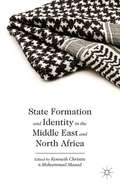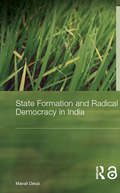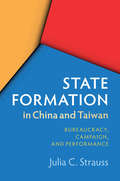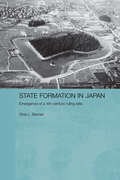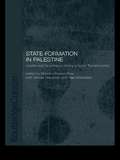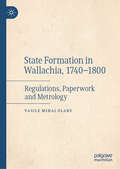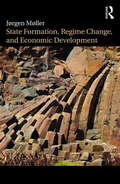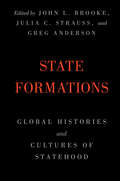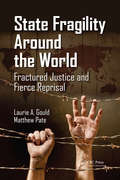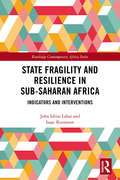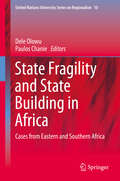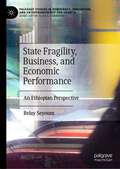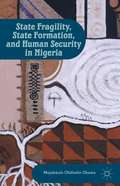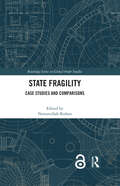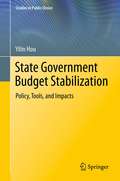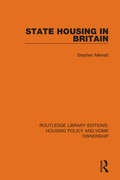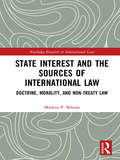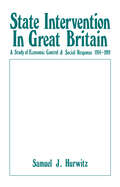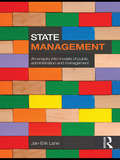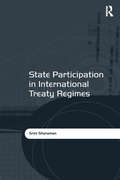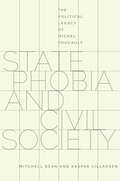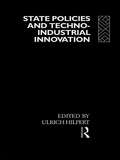- Table View
- List View
State Formation and Identity in the Middle East and North Africa
by Kenneth Christie Mohammad MasadFor states in the Middle East, North Africa, and South Asia, the "Arab Spring" has had different implications and consequences, stemming from the politics of identity and the historical and political processes that have shaped development. This book focuses on how these factors interact with globalization and affect state formation.
State Formation and Radical Democracy in India (Routledge Studies in Asia's Transformations)
by Manali DesaiState Formation and Radical Democracy in India analyzes one of the most important cases of developmental change in the twentieth century, namely, Kerala in southern India and begs the question of whether insurgency among the marginalized poor can use formal representative democracy to create better life chances. Going back to pre-independence, colonial India, Manali Desai takes a long historical view of Kerala and compares it with the state of West Bengal, which like Kerala has been ruled by leftists but has not had the same degree of success in raising equal access to welfare, literacy, and basic subsistence. This comparison brings the role of left party formation and its mode of insertion in civil society to the fore, raising the question of what kinds of parties can effect the most substantive anti-poverty reforms within a vibrant democracy. This book offers a new, historically based explanation for Kerala’s post-independence political and economic direction.
State Formation in China and Taiwan: Bureaucracy, Campaign, and Performance
by Julia C. StraussThis is an ambitious comparative study of regime consolidation in the 'revolutionary' People's Republic of China and the 'conservative' Republic of China (Taiwan) in the years following the communist victory against the nationalists on the Chinese mainland in 1949. Julia C. Strauss argues that accounting for these two variants of the Chinese state solely in terms of their divergent ideology and institutions fails to recognise their similarities and their relative successes. Both, after all, emerged from a common background of Leninist party organization amid civil war and foreign invasion. However, by the mid-1950s they were on clearly different trajectories of state-building and development. Focusing on Sunan and Taiwan, Strauss considers state personnel, the use of terror and land reform to explore the evolution of these revolutionary and conservative regimes between 1949 and 1954. In so doing, she sheds important new light on twentieth-century political change in East Asia, deepening our understanding of state formation.
State Formation in Japan: Emergence of a 4th-Century Ruling Elite (Durham East Asia Series)
by Gina BarnesThis volume brings together for the first time a significant body of Professor Barnes' scholarly writing on Japanese early state formation, brought together so that successive topics form a coherent overview of the problems and solutions of ancient Japan. The writings are, in some cases, the only studies of these topics available in English and they differ from the majority of other articles on the subject in being anthropological rather than cultural or historical in nature.
State Formation in Palestine: Viability and Governance during a Social Transformation (Routledge Political Economy of the Middle East and North Africa)
by Mushtaq Husain Khan George Giacaman Inge AmundsenThis book examines key questions and challenges the widely prevalent view that the Palestinian Authority collapsed because of its internal governance failures, its lack of commitment to democracy, and corruption. It argues that the analytical framework of 'good governance' is not appropriate for assessing state performance in developing countries, and that it is especially inappropriate in conflict and post-conflict situations. Instead, an alternative framework is proposed for assessing state performance in a context of economic and social transformation. This is then applied in detail to different aspects of state formation in Palestine, showing that the institutional architecture set up by the Oslo agreements was responsible for many of the serious failures.
State Formation in Wallachia, 1740–1800: Regulations, Paperwork and Metrology
by Vasile Mihai OlaruThis book explores the transformation of the state in Wallachia, an Ottoman tributary principality, between 1740 and 1800, by focusing on three administrative techniques: regulations, paperwork (registers, identification certificates), and weights and measures. The implementation by the central power of regulations, bookkeeping, certificates, and standard units of measurement was not smooth, but it nevertheless heralded the beginning of the struggle against localism and the efforts to extend the boundaries of legitimate state action. The author challenges the (mostly Romanian) historiography of the Phanariot period, which has portrayed the state as a set of institutions undertaking certain responsibilities and has insisted almost exclusively on its extractive function and abusive character. Instead, this book takes a closer look at how the Wallachian state functioned, examining how its means of interacting with its subjects changed in the second half of the eighteenth century. Rethinking the problem of the state in eighteenth-century Wallachia, traditionally regarded as a mere instrument of Ottoman domination, it claims that it was precisely during this time that the bases of modern statehood were laid in a context defined by imperial rivalries (Ottoman, Habsburg, Russian) in the region. Making the case for state formation in the absence of preparation for war, the author also stresses, in contrast to recent contributions that decentre the state, the need to study the process whereby the effect of state coherence is produced. While focusing on Wallachia, this book provides valuable reading for those interested in early modern administrative and legal history, the history of state formation, and Southeast European history more generally.
State Formation, Regime Change, and Economic Development
by Jørgen MøllerFailed or weak states, miscarried democratizations, and economic underdevelopment characterize a large part of the world we live in. Much work has been done on these subjects over the latest decades but most of this research ignores the deep historical processes that produced the modern state, modern democracy and the modern market economy in the first place. This book elucidates the roots of these developments. The book discusses why China was surpassed by Europeans in spite of its early development of advanced economic markets and a meritocratic state. It also hones in on the relationship between geopolitical pressure and state formation and on the European conditions that – from the Middle Ages onwards – facilitated the development of the modern state, modern democracy, and the modern market economy. Finally, the book discusses why some countries have been able to follow the European lead in the latest generations whereas other countries have not. State Formation, Regime Change and Economic Development will be of key interest to students and researchers within political science and history as well as to Comparative Politics, Political Economy and the Politics of Developing Areas.
State Formations: Global Histories and Cultures of Statehood
by Greg Anderson John L. Brooke Julia C. StraussFeaturing a sweeping array of essays from scholars of state formation and development, this book presents an overview of approaches to studying the history of the state. Focusing on the question of state formation, this volume takes a particular look at the beginnings, structures, and constant reforming of state power. Not only do the contributors draw upon both modernist and postmodernist theoretical perspectives, they also address the topic from a global standpoint, examining states from all areas of the world. In their diverse and thorough exploration of state building, the authors cross the theoretical, geographic, and chronological boundaries that traditionally shape this field in order to rethink the customary macro and micro approaches to the study of state building and make the case for global histories of both pre-modern and modern state formations.
State Fragility Around the World: Fractured Justice and Fierce Reprisal
by Laurie A. Gould Matthew PateFailed and fragile states often govern through the criminalization of otherwise inconsequential or tolerated acts. These weak states also frequently use kidnapping, murder, and other violent or oppressive tactics to maintain order and stay in power. State Fragility Around the World: Fractured Justice and Fierce Reprisal analyzes the path to state f
State Fragility and Resilience in sub-Saharan Africa: Indicators and Interventions (Routledge Contemporary Africa)
by John Idriss Lahai Isaac KoomsonThis book focuses on the indicators of fragility and the resilience of state-led interventions to address them in sub-Saharan Africa. It analyzes the ‘figure’ of fragile states as the unit the analysis and situates the study of fragility, governance and political adaptation within contemporary global and local political, economic and socio-cultural contexts. The chapters offer an indispensable, econometrically informed guide to better understanding issues that have an impact on fragility in governance and nation-building and affect policy-making and program design targeting institutions in various circumstances. These issues, as they relate to the indicators of fragility, are the contexts and correlates of armed conflicts on statehood and state fragility, the poverty-trap, pandemics and household food insecurity, and child labor. Case studies from across 46 sub-Saharan African (SSA) countries are assessed to offer clear, broad and multidisciplinary views of what the future holds for them and the international donor communities at large. Regarding state-led interventions, the authors utilize insightful statistical methods and epistemologies to explain the correlates of behavioral language frames and conflict de-escalation on battle-related deaths across the conflict zones within the sub-region, the regional and country-level interventions to end child labor, the institutional frameworks and interventions in the advancement of food security and health. This book will be of interest to scholars of economics, development, politics in developing countries, Area and African Studies, peace, conflict and security studies.
State Fragility and State Building in Africa
by Dele Olowu Paulos ChanieThis book describes the contrast between the strong economic growth and democratization that have occurred in Africa and its stalling political progress. It presents and discusses fragility as the phenomenon that has caused the state to remain weak and faltering and has led to at least one third of the continent's citizens living in fragile states. Following the examination of the drivers of fragility and the impact of fragility on citizens and neighbouring states, the book discusses capacity building approaches. This part shows how effective states can be built on the African continent, a process that would result in a change from state fragility to state resilience. It is based on lessons learnt from close studies of the nations where the state has been most developed in the region, in Eastern and Southern Africa. The book provides and responds to the most recent and up-to-date information on African development and uses insights of people who have lived and worked in the continent for most of their lives.
State Fragility, Business, and Economic Performance: An Ethiopian Perspective (Palgrave Studies in Democracy, Innovation, and Entrepreneurship for Growth)
by Belay SeyoumThe growing number of states with weak capacity to carry out basic governance functions is leading to unacceptable levels of human suffering. Using Ethiopia as a case study, this book acknowledges the multidimensional nature of state fragility and highlights the non-political factors that drive it.The first part uses institutional theory to explore how weak institutions become a source of state fragility by undermining social cohesion and the broader economic progress of countries. Part two examines the role of entrepreneurship and industrial policy as a means of creating and sustaining economic and political stability, trade policy as a means of increasing incomes and easing tensions, and technology policy as a means of engaging people in entrepreneurship and innovation. The final chapter provides lessons that fragile nations can learn from successful developing countries in Southeast Asia and Latin America.This book will appeal to researchers interested in international business, economic and business policy, international trade, and emerging markets who seek to understand how fragile states can promote sustainable peace and development.
State Fragility, State Formation, And Human Security In Nigeria
by Mojúbàolú Olúfúnké OkomeSince the 1990s, attempts at democratic transition have generated hopes for 'civil society' as well as ambivalence about the state. The interdisciplinary studies gathered here explore this dynamic through the complex interactions of state fragility, self-help, and self-organization in Nigeria. Nigeria stands as a particularly interesting case, as its multifaceted associational life extends far beyond civil society organizations (CSOs) and non-governmental organizations (NGOs): as this volume reveals, there is a 'third sector' of Nigerian society encompassing everything from community self-help programs to ethno-religious affiliations to militias. Some of these formations have narrow, pragmatic aims, while others have an explicit socio-cultural or political agenda; most can be understood as compensating for the state's failure to deliver services and maintain regulatory frameworks. By examining the emergence of broader forms of civil society, this volume considers their successes while also assessing their costs and contradictions.
State Fragility: Case Studies and Comparisons (Routledge Series on Global Order Studies)
by Nematullah BizhanPresenting case studies and comparisons across seven countries, this book addresses key questions as to the nature of state fragility, policies used to mitigate it, assessment of outcomes and prospects. It offers a novel empirical contribution in examining a range of distinct but interdependent dimensions of state fragility, not only focusing on questions of state legitimacy, capacity and authority, but also involving the economy and resilience to political and economic shocks, as well as at vital questions of context and diversity. Examining Afghanistan, Lebanon, Burundi, Pakistan, Sierra Leone, Papua New Guinea and Rwanda within the context of their different local circumstances, and within broader questions of global security, the book identifies unique factors that have played a part in their specific context and explores key drivers and dominant features. This book will be of key interest to scholars and students of state fragility and more broadly to students of politics, public policy, development studies, state-society relations, political economy, state building, peace and conflict studies, international studies, security studies regional studies., as well as NGOs and international organizations.
State Government Budget Stabilization
by Yilin HouThis book is the first comprehensive, full-scale treatment of the law, politics and economics with regard to the policies and policy instruments for budget stabilization at the state level. Covering the period from 1946 through 2008 in the United States, it provides details on the methods and results of empirical tests of the effects of budget stabilization instruments on government operations, public service provision, and some other aspects of social and economic life. With the lingering effects of the most recent financial crisis and economic downturn, and the subsequent Tea Party movement advocating smaller government and deficit reduction, this book carries timely and important theoretical as well as practical implications, particularly in regard to the potential for counter-cyclical fiscal policy in mitigating negative impacts during a recession. The first contribution of the book is in public finance theory: it provides insights into the applications of the stabilization function in the context of strong government, thereby refining Keynesianism. The second aspect is in Public Choice: the creation and functioning of budget stabilization funds offer extra evidence to demonstrate that the general public provides input and voice in more than the conventional ways when it comes to policy making, even in an area dominated by strong government. The third aspect is in policy making, exploring the opportunities for refining policy tools in preparation for future downturns.
State Housing in Britain
by Stephen MerrettOriginally published in 1979, this book was the first to provide a comprehensive political-economic analysis of the historical origins and 20th Century experience of state housing in the UK. The first part describes the growth of municipal housebuilding in the context of slum clearance before 1914 and the cycle of boom and slump between the wars. Part 2 covers 1945- 1980 with chapters on : site acquisition and residential densities; the housebuilding industry and its standards; the balance between rehabilitation and redevelopment and the rise and fall of the high-rise flat. Sources and costs of capital finance and the management of the stock of council dwellings is also discussed. The final part reviews the development of state housing policy since the War, within a broad political and macro-economic context.
State Interest and the Sources of International Law: Doctrine, Morality, and Non-Treaty Law (Routledge Research in International Law)
by Markus P. BehamThis book addresses the disparity between positive non-treaty law and its scholarly assessment in the area of moral concepts, understood as altruistic as opposed to reciprocal legal obligations. It shows how scholars are generously willing to assert the existence of a rule of international law, thereby moving further away from actual state practice, not taking into account the factors of legal rhetoric and the core survival interests of the state in the formation of custom and general principles of law. The main argument is that such moral concepts can simply not manifest themselves as non-treaty sources of international law from a dogmatic perspective. The reason is the inherent connection between the formation of the non-treaty sources of international law and state interest that makes it difficult, if not impossible, to assess state practice or opinio juris in the case of altruistic obligations. The book further demonstrates this finding by looking at two cases in point: Human rights and humanitarian exceptions to the prohibition of force. As opposed to the majority of existing works on the subject, State Interest and the Sources of International Law takes a bigger-picture approach to a number of distinct problems in international law scholarship by looking at the building blocks of international relations on the one hand, and merging this with sources doctrine on the other. It will be of interest to researchers, academics, and students in the fields of international law, human rights, international relations, political science, legal philosophy, and legal theory.
State Intervention in Great Britain: Study of Economic Control and Social Response, 1914-1919 (Columbia University, Studies In The Social Sciences #No. 546)
by Samuel J. HurwitzFirst Published in 1968. Routledge is an imprint of Taylor & Francis, an informa company.
State Learning and International Change
by Andrew FarkasExplaining change in the behavior of states and other international actors is at the core of the study of international relations. The proficiency with which states respond to changes in the international environment has important consequences for world peace and the world economy as well as domestic politics and well being. One way to understand changes in behavior is to consider whether and how states learn. Key to understanding this is considering how the groups responsible for making decisions learn and make decisions. Andrew Farkas presents an evolutionary theory of how states adjust their foreign policies in response to international changes. Employing both formal models and computer simulations, Farkas explores the relative efficacy of a wide range of alternative strategies for dealing with unanticipated changes in the international environment, and goes a long way toward reconciling the success of rational choice modeling with criticism from psychological studies of decision making. Farkas looks at the way small groups charged with making policy decisions work. He explicitly models the process of search and policy selection. He demonstrates how a group of disparate individuals can act as if it were a unitary rational actor and provides the first endogenous account of when and why groups curtail their search for satisfactory policies. Farkas uses the general model to explore the effects of different institutional designs on the decisionmaking process. This book will be of interest to scholars of international relations, learning models and group processes. Andrew Farkas is Assistant Professor of Political Science, Rutgers University.
State Making in Asia (Politics in Asia)
by Richard Boyd Tak-Wing NgoIncluding contributions from an international team of leading experts, this volume examines state making from a uniquely Asian perspective and reveals some of the misunderstandings that arise when states and state making are judged solely on the basis of Western history. The contributors argue that if we are to understand states in Asia then we must first recognize the particular combination of institution and ideologies embedded in Asian state making and their distinctiveness from the Western experience. Presenting new empirical and conceptual material based on original research, the book provides a unique theoretical reflection of the state through a thorough comparison of East Asian nations and, as such, will be a valuable resource to scholars of Asian politics and international relations.
State Management: An Enquiry into Models of Public Administration & Management
by Jan-Erik LaneState Management offers a comprehensive yet concise introduction to the new field of state management, presenting an analysis of basic questions within the theories of bureaucracy, policy-making, principal-agent modelling and policy networks. Focussing upon recent state transformation, it illuminates public sector reform strategies such as New Public Management as well as incorporation, tendering and bidding, decentralization, team production and privatization. This book argues that we should look upon the variety of models or approaches to public management or public administration as all belonging under "state management". The so-called "working state" in a well-ordered society involves government delivering services, paying for social security and respecting the rule of law. In this text, Jan-Erik Lane systematically examines the key approaches to the study of how government attempts to achieve these goals, discussing the pros and cons of alternative frameworks of analysis. Each chapter discusses a different issue within state management that is integral to the broader debate, including: Public regulation The relationship between the law and the state Combining ecology and policy making Multi-level governance The virtues and vices of public-private partnerships Policy implementation Presenting a clear overview of how the state operates when government sets out to deliver public services, and generating questions to encourage new research, State Management is a valuable new text for both undergraduate and postgraduate courses in political science, public administration and public management.
State Of The Union 1994: The Clinton Administration And The Nation In Profile
by John Feffer John Cavanagh Gerald Horne Richard CaplanClinton rode into office on the promise of "change." It was a safe, content- free slogan. After all, in recent years, the most radical proposals for change have come not from the Democrats but from the Republican right. "Change" could mean the further downsizing of government and neglect of social problems, or, of course, the reversal of these trends. When they went to the polls in 1992, however, most Americans had a good idea of what kind of change they wanted.
State Participation in International Treaty Regimes
by Srini SitaramanWhy do some states resist entering into international treaty regimes while others demonstrate eagerness to participate? Although factors such as degree of pressure exerted by international actors, ambiguity in the treaty language and a regime's 'lack of teeth' (enforcement and sanctioning mechanism) do affect participation, this book investigates whether internal (domestic) factors may ultimately be responsible for influencing why a state resists or joins international treaty regimes. The volume draws on United Nations treaty ratification data from three different issue areas - arms control, environment and human rights - to study the participation patterns of democracies and non-democracies in international treaty regimes. Incorporating two in-depth case studies on the United States and China, the author traces the impact of domestic institutional structure, state capacity and internal social norms on state decisions to resist or participate.
State Phobia and Civil Society
by Mitchell Dean Kaspar VilladsenState Phobia draws extensively upon the work of Michel Foucault to argue for the necessity of the concept of the state in political and social analysis. In so doing, it takes on not only the dominant view in the human sciences that the concept of the state is outmoded, but also the large interpretative literature on Foucault, which claims that he displaces the state for a de-centered analytics of power. Understanding Foucault means understanding all his interlocutors--whether Marxists, Maoists, neoliberals, or social democrats. It requires turning to Foucault's colleagues, including Deleuze and Guattari, François Ewald, and Blandine Kreigel, in relation to whom he carved out a position. And it entails an examination of his legacy in Hardt and Negri, the theorists of Empire, or in Nikolas Rose, the influential English sociologist. Foucault's own view is highly ambiguous: he claims to be concerned with the exercise of political sovereignty, yet his work cannot make visible the concept of the state. Moving beyond Foucault, the authors outline new ways of conceiving the state's role in establishing social order and in mediating between an inequality-producing capitalist economy and the juridical equality and political rights of individuals. Arguing that states and their cooperation remain of vital importance to resolving contemporary crises, they demonstrate the interdependence of state and civil society and the necessity of social forms of governance.
State Policies and Techno-Industrial Innovation
by Ulrich HilpertBehind the rhetoric of `intervention' and `deregulation' which has accompanied state attempts to stimulate technological innovation in the last decade is secreted a story of failed ambitions, confusion, muddle and incoherence.Techno-industrial innovation does make demands on the state, not only in terms of new industries, but also in regard to the inter-relation of industrial and R&D policy and the creation of markets.This book provides a comparative analysis of techno-industrial innovation in Europe, Japan and the USA. Drawing on case studies ranging from the semi-conductor to the biotechnology industries, the book presents a comprehensive and detailed survey of national strategies for the internal and world markets and sets them in their political context, where `the costs may be high and the pay-offs uncertain'.
